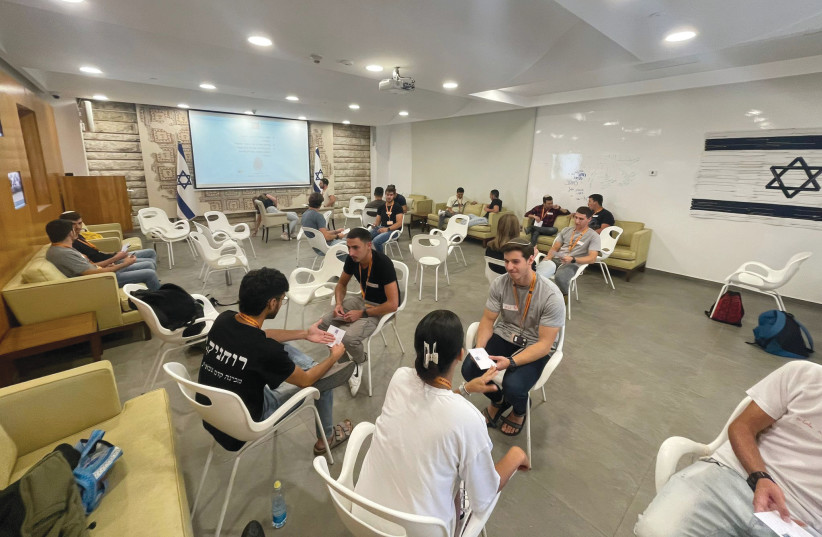Hundreds of thousands of Israelis have marched through the streets to protest the government’s judicial reform plans for several months. Israeli society has reached a boiling point, and the fear is that the country will splinter.
To help reduce the feeling of polarization in the nation, bridge social gaps, and strengthen national resilience, President Isaac Herzog recently kicked off a series of special projects under the umbrella of Time to Talk.
Working with the Israeli Association of Community Centers (IACC) and a handful of other strategic partners, the multi-pronged program is meant to start a productive dialogue.
“We have had a crisis within Israeli society for a long time. It did not start with legal reform,” said IACC chairman Arie Zuckerman. “There is a big crisis between our Jewish and Arab populations. For many years, there has been tension between the haredim [ultra-Orthodox], religious, and non-religious populations. Only now, with the legal reform, we all realize this crisis needs to be addressed. We need to find a way to live with each other.”
Herzog came up with his vision for Time to Talk and announced it in a speech in January before Justice Minister Yariv Levin revealed his judicial reform program. According to the president’s strategic adviser Barak Loozon, Herzog said that as Israel approaches 80 and he [Herzog] nears the end of his term, he wanted to see an Israeli society that is more resilient.

“Former president Reuven Rivlin spoke about the tribes of Israel,” Loozon recalled. “Herzog wants to take the next step – not only to talk about diversity and inclusion but also help Israeli society build its internal capabilities to manage tensions and survive and thrive.
“The president believes,” he continued, “that our differences are not a problem but the part of our DNA that always allows us to innovate and create from new.”
Launching Time to Talk amid debates on Israeli judicial reform
When the judicial reform debates started, the president and his team realized how on point his vision was. So, this month the formal Time to Talk program was launched at the President’s Residence. The program centers on learning how to better talk to one another, empathize with one another, and develop safe spaces where people can share their views and not feel threatened.
Some discussions are taking place at the President’s Residence, where Israelis from every walk of life come together to examine the challenging issues, accompanied by professional mediators.
At the same time, similar discussions will be taking place in hundreds of community centers across the country. A related program, Words in Motion, brings vans of people from one community center to another for gatherings and discussions. Sometimes the meetings involve dance, theater, or artwork.
“We launched a national graffiti project,” Zuckerman said. “Each community center is working on its graffiti project that touches on identity elements in their specific community. Eventually, we would like to combine all of these community graffiti projects into one big picture. It would be a picture of the Israeli nation.”
It would also be the largest community graffiti project in the world.
Similarly, working with Maala, which promotes corporate responsibility and responsible management in Israel, efforts are being made to develop tools to deal with diversity in the workplace, Loozon said.
“Many offices in Israel are very diverse. In today’s tensions, managers do not have the tools to deal with this diversity. What they thought was an asset in the past is a challenge today,” he explained.
The team is gathering best practices from companies that have made it work and is developing a train-the-trainer program.
Modeled after London’s Chatham House and under the title Home to All Voices, the President’s Residence is working with a team of analysts to identify critical tensions in Israel and what must be done to address them. Then, discreetly, diverse stakeholders will be brought to the President’s Residence for facilitated discussions.
“We are not trying to solve the problems but to build trust and reduce the potential for violence,” Loozon said.
Finally, in partnership with the Jewish Agency and the World Zionist Organization, the President’s Residence is running Voice of the People, where discussions will be held on the most critical issues in the Diaspora, and the next generation of leaders will be found worldwide.
The programs are funded through the state, as well as by donors, including many Diaspora organizations, such as the Jewish Federations of Canada, Russell Berrie Foundation, The Klarman Family Foundation, and the Aviv Foundation.
“There is a silent majority who want to see this debate going on [about judicial reform] in a safer way that does not endanger the whole existence of the nation and country,” Zuckerman said. “These kinds of activities give you a way to respect the view of the other and create understanding in conflicts that may look unresolvable on a national level.”
Loozon said that the programs are based on research and precedent to help ensure their success. He said the team is developing a series of measurements to track improvements. Each year, for example, the Israel Democracy Institute conducts polls on trust in several aspects of Israeli society. Loozon said he wants to see those numbers improve.
“We believe that Israel does not want to be divided,” he concluded. “There are a lot of beautiful Israelis doing everything they can to connect.”
